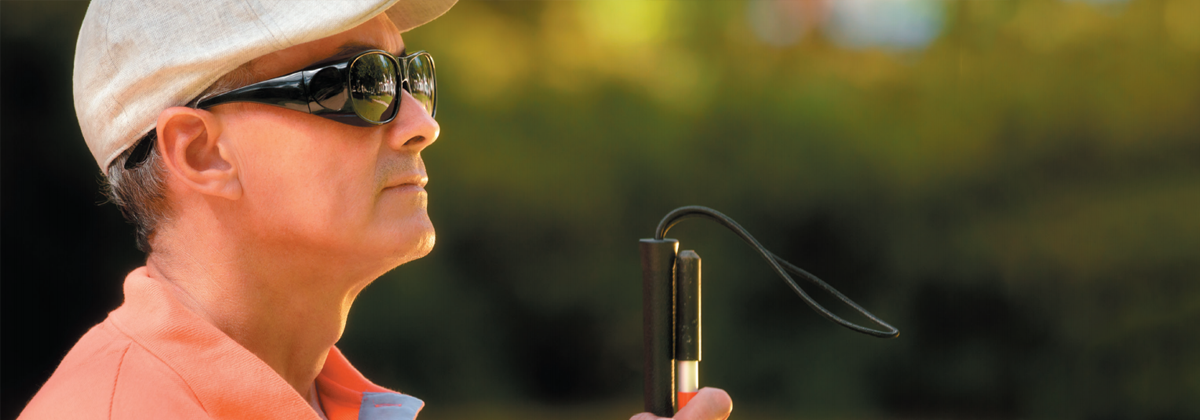- Special and Early Education
- Undergraduate Programs
- Special Education: Vision Rehabilitation Therapy (B.S.Ed.)
Special Education: Vision Rehabilitation Therapy (B.S.Ed.)

People with visual impairments are just like everyone else: They want to live independently, and they want to thrive as productive, responsible adults. However, doing so requires the special assistance of vision rehabilitation therapists who coach them in the development of those skills. If you’re passionate about helping launch those lives, our experiential and research-informed Vision Rehabilitation Therapy (VRT) program will prepare you for that rewarding career.
This specialization prepares you to obtain national licensure from the Academy for the Certification of Vision Rehabilitation and Education Professionals as a vision rehabilitation therapist, but it does not qualify you for professional educator licensure in the state of Illinois.
When you are admitted to NIU to pursue the B.S.Ed. degree in Special Education you'll enter directly into the major program.
- Admission to teacher education and retention in this major require a university GPA of 2.5.
- Grades of C or better are required in specific major courses.
- Candidates who do not meet these requirements must retake the course(s).
The NIU College of Education embeds diverse, real-world learning opportunities in our programs, offering you valuable experiences you won’t get anywhere else.
- Our faculty collaborate with students to facilitate research, service and teaching initiatives within Illinois and throughout the country.
- Students progress through the program as a cohort group, developing friendships and professional partnerships that last well beyond graduation.
- Students in the Vision Rehabilitation Therapy program learn various assistive technologies and practice those through hands-on learning activities in the Vision Assistive Technology lab.
- The program includes various field experiences and concludes with an internship working directly with adults with various vision challenges under the supervision of a certified vision rehabilitation therapist.
As one of a very few accredited vision programs in the United States, we place an extensive emphasis on assistive technology. This unique preparation provides you with the latest tools you can use to promote the independent living skills of adults with vision issues. Therefore, you’ll receive intensive training and support through your coursework and field experiences specific to that population. We also host on-campus training from Perkins School for the Blind experts, who demonstrate the latest technology, and from representatives of The Seeing Eye, who provide lessons in guide dogs.
- SESE 240 Introduction to Special Education (3)
- SEVI 410 Anatomy, Pathology, and Functioning of the Eye (3)
- SEVI 420 Literary Braille (3)
- SEVI 430 Basic Orientation and Mobility for Teachers of Persons with Visual Impairments (3)
- SEVI 440 Communication Systems Used By Persons with Visual Impairments (3)
- SEVI 441 Instructional Systems for Use of Low Vision in Educational Settings (3)
- SEVI 443 Teaching Activities of Daily Living to Persons with Visual and Multiple Disabilities (3)
- SEVI 445 Home Management for Persons with Visual Impairments and Multiple Disabilities (3)
- SEVI 447 Collaboration among School Professionals Working with Students with Visual and Multiple Impairments (3)
- SEVI 450 Assistive Technology for Individuals with Visual Impairments (3)
- SEVI 451 Assistive Technology for Persons with Visual Impairments: Advanced Topics (3)
- SEVI 460 Rehabilitation of Adults with Visual Impairments (3)
- SEVI 481 Practicum in Rehabilitation Teaching of Persons with Visual Impairments (1-12)
- SEVI 489 Internship in Rehabilitation Teaching of Person with Visual Impairments (1-12)
Current job prospects for the foreseeable future are excellent, particularly if you’re willing to relocate. Job opportunities include working with adults through state rehabilitation agencies and Offices for the Blind and Visually Impaired as well as through the Department of Veterans Affairs. Many of our graduates are recruited by personnel at their internship sites.
"The thing that made me notice how well I was prepared for this field was in seeing how other people who weren’t educated in this field try to instruct the visually impaired. They say, ‘Over here. Over there.’ It doesn’t work like that. I had great instructors at NIU."by Kevin Allison, 2015 alumnus
- Undergraduate Programs
- Early Childhood Education (B.S.)
- Special Education, Learning Behavior Specialist I (B.S.Ed.)
- Special Education, Special Populations (B.S.Ed.)
- Special Education, Vision Rehabilitation Therapy (B.S.Ed.)
- Special Education, Visual Impairments (B.S.Ed.)
- Special Education Foundations (Minor)
- Inclusive Teaching Practices (Certificate)
- Young Children with Disabilities Studies (Certificate)
- Special Education (Endorsement)
Contact Us
Special and Early Education
Allie Shirar, Academic Advisor
815-753-9034
ashirar@niu.edu